
December 31, 2008
 CR Holiday Interview #9: Batton Lash
CR Holiday Interview #9: Batton Lash

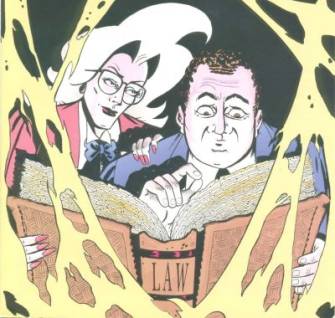
*****

I've said this so many times it's part of the interview that follows:
Batton Lash is one of my favorite people to see at comics conventions, when he's nearly always in the company of publishing and life partner Jackie Estrada. Lash is funny, he's full of stories and he's really, really nice. I'm never sure how these things get counted, but 2009 appears to be the 30th anniversary of his Wolff & Byrd feature, which started as
Wolff & Byrd, Counselors of the Macabre and is now running on-line and in print under the appellation
Supernatural Law.
Lash has more than proven his devotion to his strip over the years: following it into different formats, re-working old material whenever he gets the chance, hand-selling it after reaching the limits of what
the direct market has to offer him. In addition to affording me the opportunity to learn more about his unique story -- which includes being born in Brooklyn, being taught at SVA during one of that school's heydays, and currently freelancing with both Archie and Bongo in addition to be one of the last standing traditional self-publishers -- I thought he'd have a measured perspective on the modern comics industry. I was happy he agreed to talk to me, and enjoyed our conversation. -- Tom Spurgeon
*****
TOM SPURGEON: We're talking close to Christmas... Do you have any holiday traditions? Do you keep cartooning through the holidays?
BATTON LASH: The cartooning goes on all the time. I have pads all over the house. I'm always jotting down ideas. I don't know if you're aware, I'm also doing stuff for Archie and Bongo. Whenever something hits me I have to make sure I write it down right away or else I forget it. It's a 24/7 operation.
As far as holiday traditions, it's interesting that this interview is today, because it's the day
we're getting our Christmas tree. We always look forward to that, because
Steve Darnall -- I'm sure you know who that is -- he had his wife Meg always put together a beautiful CD of obscure novelty Christmas tunes. Jackie and I have been fortunate to be on their mailing list each year. We always trim the tree to Steve and Meg's CD. That's as close to a tried and true, ironclad tradition that we adhere to.
SPURGEON: I wondered, because I know you're a Brooklyn boy, and you're in San Diego now. That's about as far away from Brooklyn as you can get. I wondered if the holidays were different than what you had grown used to.
LASH: I'll be honest, it took a long time to adjust. This particular December has been very chilly, so it at least felt seasonal. That puts me very much in the holiday spirit. Being in San Diego doesn't bother me as much as it used to. But I never, ever get used to waking up Christmas morning and seeing guys walking their dogs wearing only shorts and no shirts.
SPURGEON: You're a School of Visual Arts grad. Are you still close to your schooling? Do you still reference back to your training, or is it one of those arrangements where you had the education once upon a time but you've since put together your own set of skills?
LASH: Funny that you should bring up SVA. I was just in New York several weeks ago. Their cartooning society was nice enough to ask me to give a lecture. I talked about my experiences of being a student there and trying to break into the industry. It didn't seem so long ago that I was in their spot, but I guess it was! By the way, the "Cartoon Allies" (that's the name of the society) were terrific. A lot of talent there. I think I got more out of talking to them than they got listening to me!
As far as what you're asking me, for the first few years after graduating SVA, I had mixed feelings. I looked back, and thought, "Did I just waste five years of my life? What's going on?" [Spurgeon laughs] But as time went on, the information I got from school, whether from class or just by osmosis, sort of settled in. Stuff that I didn't quite understand at the time, I began to "get it" by having my own experiences in the freelance world.
The thing about Visual Arts is that they've always promoted that the people in the business are your instructors. So you had freelancers teaching students. I graduated in '77, and maybe in 1984 I'm sitting in my studio and going, "Oh, I get it now. Right, right, right, right, right." I look back now and I'm very happy that I did attend the school. Plus I'm stunned by the instant bonding with the people who went to Visual Arts. It's like being in the War or something. "Visual Arts?" "Yeah, Fine Arts, one year."
SPURGEON: When I hear SVA grads talk it almost reminds me of the guys I know that graduated from military academies, as silly as that may sound. I think there's a special bond between cartoonists who share that kind of very specific academic experience.
LASH: That's a byproduct I didn't even consider when I graduated. It was nice. When I met Jackie, she knew a lot of people in the comics industry. I knew a few -- mainly from SVA. She would ask, "How do you know
Kyle Baker? How do you know
this person? How do you know
that person?" My answer was always, "We went to Visual Arts." After a while, she says, "Let me get this straight. Did everyone in comics go to this school??" It seemed to be my reference point for a lot of people.
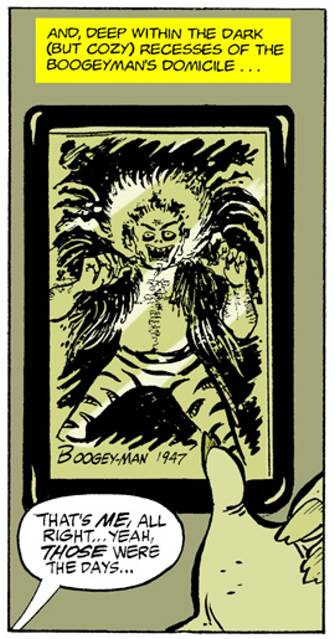 SPURGEON: How long have you been on-line with
SPURGEON: How long have you been on-line with Supernatural Law
to the extent you are now?
LASH: Three years. We started in 2005.
SPURGEON: Has the move been beneficial for you?
LASH: I'm still in print, too.
SPURGEON: Of course. I guess what I'm getting at is that you have a substantial amount of work on-line. It is full-bore on-line publishing, not a web site with sample strips. You're still publishing in print, but you're publishing on-line, too.
LASH: It's ongoing. I put stuff up on Mondays and Thursdays. Something is up there twice a week. I'm currently doing a new story, but I went into reprint mode for a while when I was doing
Archie: Freshman Year. I also had some family things to take care of on the East Coast, so that took up a lot of my time. But even with the reprints, it's new to new readers. And it's in color. I can't help but redraw certain things. Everything is a work in progress, as far as I'm concerned.
To answer your question, I think being online has been a tremendous boost. We know the situation with indies and comics stores. I think I've gone as far as I can go in the direct market. Even if
Supernatural Law were the #1 TV show coast to coast, and President Obama said Wolff and Byrd are his favorite comic book characters, stores who have never carried my books still wouldn't carry them. I will never win them over. I'm grateful for my supporters and I appreciate all the retailers who do carry and promote my books, but I'm not going to get any new stores. The Web has introduced Wolff and Byrd to people who have never seen the comic because either their neighborhood stores don't carry it or they've been out of the loop or, best of all, they just pick it up from a link. Then they order the books from us. Or Jackie and I direct them to a store that does support us in their area. "This place carries
Supernatural Law and they're well-stocked, so check them out."
My mantra has always been "one reader at a time." That's the way it goes. I'm very happy to do that, too. I'm still here, able to do the next installment, the next issue, the next collection. I've always been here for the long haul.
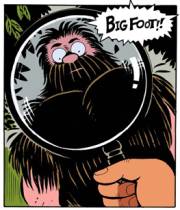 SPURGEON: Unlike a lot of creators for whom taking it on-line is the first major change they've embraced, Wolff & Byrd have been fairly mutable over the years. It's on-line now, I think of it as a comic book, and it also had a long run as a magazine strip.
SPURGEON: Unlike a lot of creators for whom taking it on-line is the first major change they've embraced, Wolff & Byrd have been fairly mutable over the years. It's on-line now, I think of it as a comic book, and it also had a long run as a magazine strip.
LASH: Newspaper.
SPURGEON: Excuse me.
LASH: Wolff & Byrd started in a local weekly called
The Brooklyn Paper, and was picked up by
The National Law Journal. The Law Journal strips are what
CBG reprinted. I have to say, you could have knocked me over with a feather when
Don and
Maggie Thompson told me, "Hey, we want to run this." I really appreciated the platform Don and Maggie gave me; that was a great opportunity to get my name and characters in front of the comics industry every week. Meanwhile, the
Law Journal was giving me a good rate and I was getting my chops along the way. Learning on the job!
SPURGEON: You've always pursued the market that's presented itself to you. You haven't been dependent on a specific format. If there's another market tomorrow, I have a feeling you'd pursue that. You're very devoted to your strip in a consistent way.
LASH: Thank you, I appreciate that. You go where the markets are. Also, I'm from the Old School. For better or worse, people like
Chester Gould and
Leonard Starr and
Milton Caniff, were on their strips for years and years and years, and I always liked that. They created a familiar atmosphere that gave the reader a feeling of "Welcome to the family."
I always liked my characters. I enjoy working on them. I told you about the pads around the house. All of the characters have little backstories that maybe only I would ever know, but it's fun doing that. I was chastised by someone in the industry who said I should give up
Supernatural Law [Spurgeon laughs], and that everyone's tired of it. Well, everyone hasn't seen it yet. Do something new? I enjoy doing this and there's people who enjoy reading it. I don't understand the attitude of "if it isn't a blockbuster the first weekend, it sucks." It kind of irks me.
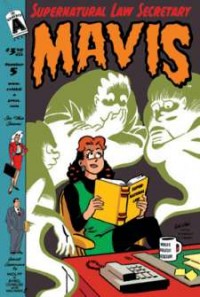
You see a lot of problems in mainstream comics where people keep jumping from project to project. So you've got 20 different versions of Batman or Spider-Man. Or whatever character. There is no one vision. Like I said, there was a time, better or for worse, you'd have
Stan and
Jack on a long run. At least you had some traction. Sure, I have some other concepts, but everything takes so long, and as I get older it takes me even longer to do things. For now, I'm happy to concentrate on Wolff & Byrd... Mavis, too!
I'm getting to be more of a perfectionist. You mentioned the strip. I am grateful for anyone that stuck with me since the strip days, because I look at those strips now and go, "Oy vey!" I'm glad people gave me a chance! The old work makes me cringe sometimes. Now I try to take a lot more care with my artwork. Back in those days it was, "I gotta get it out, get it off my desk, there's no fooling around with the
Law Journal's deadline -- get it there, end of story."
SPURGEON: You talked about something in Chris Brandt's film Independents
that I thought was pretty great in that you looked at the grief that some of your fellow professionals that are more freelance-oriented go through to get assignments, keep assignments, dealing with the politics of it.
LASH: You mean the work for hire stuff.
SPURGEON: Yeah. And while you have that aspect to your career, you seemed in that footage to take some satisfaction out of being the captain of your own ship. Is that fair?
LASH: Yeah. Well, I don't know about satisfaction. No, you're right. You're right about that. I'm very fortunate I draw just well enough I can illustrate my own stories. My heart goes out to a lot of writers who can't draw. They're very frustrated. You can tell they want to do their own thing and not be beholden to work for hire stuff. If they could do their own webcomic or, back when it was really viable, their own self-published comic, they would; but they're stuck being dependent on another artist.
If I had to make a living by soliciting scripts from Marvel or DC, I would not be in the comics business. I just don't have the head for that sort of... struggle. Or office politics. I was very fortunate that with my two work-for-hire gigs,
Archie and
Bongo, they both approached me. Now, having said that, last year, since I know
Mike Carlin very well -- SVA alumni, by the way [Spurgeon laughs] -- I approached him with two pitches. Actually, two artists told that if I ever pitched something to DC, I could attach their names to the projects because they wanted to work with me. Isn't that nice? Anyway, I thought if DC accepted the pitches, it would be a lark to work on some of their old characters. But DC passed. It wasn't a biggie. I certainly never have a yearning to get a
Wolverine mini-series going or else. That's just not my thing.
SPURGEON: I liked what I read of your Archie mini-series, Freshman Year
.
LASH: Oh, thanks.
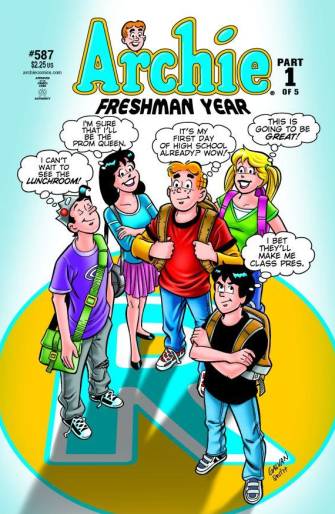 SPURGEON: How do you find a place for yourself creatively in an assignment like that? Those characters are as well worn as any characters out there... how was that experience generally?
SPURGEON: How do you find a place for yourself creatively in an assignment like that? Those characters are as well worn as any characters out there... how was that experience generally?
LASH: It's fun. I always liked the Archie characters. The first time I worked with them was on
the Archie/Punisher one-shot. And
Victor Gorelick, the editor-in-chief, always liked my writing. He always wanted me to do more. But there was never enough time, and like I just told you, I don't really pursue the freelance thing as much as I should. Even when it lands in my lap.
When they came to me with the
Freshman Year concept, I just took what they already had established with the Archie characters and kind of dug into my memory of what I was like as a teenager. I've totally romanticized my teenage years out of proportion. We all had miserable times, but I concentrated on the lighthearted incidents and the fun times. And I put that into
Freshman Year.
I'm not sure that answers your question!
SPURGEON: I just wondered if you're writing Archie
-- or by extension a lot of these kinds of characters and concepts -- where does the satisfaction come from? Do you have a vision of Archie
in your head? Is it a standard of craft you want to achieve? Is it simply about trying to find that connection?
LASH: I have no pretension that I'm going to give the world the
Archie they've always been waiting for. [Spurgeon laughs] It's nothing like that. Even when I do
Wolff & Byrd, I think, "What's the kind of thing that I liked to read when I was a fan and went to the newsstand every Tuesday?" The mandate was Archie and the gang in their freshman year. What would I have liked to have read? So I apply that. I threw in a few autobiographical elements that made it fun for me, that after all these many years to see it in cold print, things that happened to me in high school, it's a kick to me. I'm sure if it happened to me, it happened to other people and it's happening to kids today. It's always great when someone comes up to you and says, "That thing you wrote; I felt exactly that same way." It's nice.
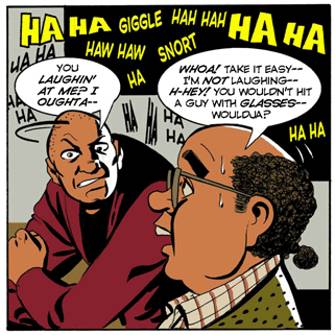 SPURGEON: Do you purposefully try to keep the
SPURGEON: Do you purposefully try to keep the Wolff & Byrd
stuff frozen in time? Is it a balancing act? There's character progression, but you're not focused on character progression. Does that go back to a personal preference, writing something you want to read?
LASH: What keeps me there is economics, so that when I reprint the material I don't have to worry about it being too dated. Except for a couple of details, the
Stan Lee/Steve Ditko Spider-Mans could be taking place today. They kind of have a timeless quality about them. So do classic comic strips if you disregard references to
Tojo or whatever. People are people. Fashion changes, but human nature remains constant.
I've always tried to keep it timeless. There's never been a saga.
Cerebus was a 300-issue story.
Supernatural Law is not like that at all. There's no timeline. I'm from the Old School in that rule #1 is that every issue is someone's first issue. I don't want them to be turned off by an ongoing saga that they feel they can't catch up on. I want newbies to feel they can jump right into it.
SPURGEON: You placed the original strip on Court Street in Brooklyn. It was surprising to me to hear of there being a real place that it was based on, because of the overwhelmingly iconic sense of settings I get from your work. It seems very organic that way.
LASH: That's good...
SPURGEON: Oh, it's all good. One thing I thought might help you keep the strip timeless is your strong focus on the foregrounded plot as opposed to an accretion of character detail. With that tight a focus on plot, how do you guard against repetition?
LASH: I don't know. [Spurgeon laughs] I like to think I'm learning all the time. I appreciate you pointing out the thing about plot. I think the most important thing is story structure. That's what I concentrate on the most. I'm fascinated by the rhythms of a story.
SPURGEON: Is that something that comes naturally to you?
LASH: I know it sounds like bragging, so trust me when I say was a terrible student, but when I took my report card home my parents would say, "You did lousy in everything, but why did you get an A in English?" It's because I always had the best compositions in class. The teacher would tell us to write about something, and I would construct my stories as much as a sixth grader could. I was always interested in story. I'm always trying to entertain. You're doing good when a reader identifies with a character, so I work on characterization. But I put that in the back seat to make sure that the story goes from A to Z without any problems. The story structure is the most important thing.
SPURGEON: Did I see some Li'l Obama cartoons from you this year?
LASH: Yeah.
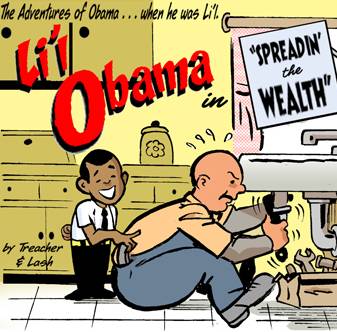 SPURGEON: Was that a major enterprise?
SPURGEON: Was that a major enterprise?
LASH: No. It started as a lark. I guess I was so chagrined over Obama's policies and the shameless fawning he as getting from the press that I had a need to get a dig in. A blogger that I follow, a very funny and witty observer of politics and pop culture,
Jim Treacher, got me going. I forget how I originally got a hold of him. I think I commented on one of his (non-political) postings a few months ago, and he replied to me and he said he knew who I was and knew my comics. That surprised me.
So I had this cartoon and I didn't know what to do with it. I wrote to Treacher. I knew he was throwing some darts at Obama and the media's love affair with him. I e-mailed him if he wanted to put my cartoon on his site. He was only too happy to do that. He wrote back a couple of weeks later and said, "I can't draw to save my life. But I have ideas. What if I wrote them up and you drew them." It sounded like fun. I had never worked that way before. We did a few strips, and it was a blast. I like Treacher. I've only communicated with him by e-mail, though.
SPURGEON: I remember the cartooning itself as lively.
LASH: Thanks. I did it for free, and I also had a ton of deadlines at the same time. I was forced to economize the drawing, so I really just banged it out. I tried to make the color work with it. I'm glad you liked it.
SPURGEON: You talked earlier about looking back at your old strips... do you feel you're a better artist now? How might you be a better artist?
LASH: I'm probably the least objective when it comes to looking at the artwork. Jackie will tell you that we'll go to press with something, I'll say, "Let's hurry up and get the next issue out as quickly as possible so people will forget the current one." And she'll go, "What are you talking about? It looks fine." After I sleep on it and don't look at the issue until the proofs come in, I'll say, "This doesn't look as bad as I thought!"
When you're younger, you fantasize about being
Barry Windsor-Smith or
John Buscema -- and I know I'm dating myself by those names here. At a certain point, you know you're never going to be those people. You won't match their draftsmanship. So you just work with what you have. I remember in SVA, when I had
Will Eisner as a teacher. He was always telling me, "Pull back. You're trying to be something you're not." He said, "Look at animation. Look how open that is. Learn to economize." I've always tried to do that. If anything, I've stopped putting in useless detail. I've looked at some of my recent stuff, the web stuff. It's very open and clean looking. I think I got cleaner, let's say that. I'm still working at cleaning up.
SPURGEON: Have you enjoyed the opportunity to work in color on a regular basis?
LASH: Oh, yeah. In fact, I'm scheming to do a color print issue. I'm still 20th Century enough that I have to have a color comic book in my hands. Just what you can do with light and shadow and not rely on black is fascinating to me. Look at some of the old comics, stuff during the '50s when the printing was terrible and the separations were done by old ladies in printing shops. Even then, the way they would use color, sometimes just two colors to suggest a mood, it works beautifully. More so than today.
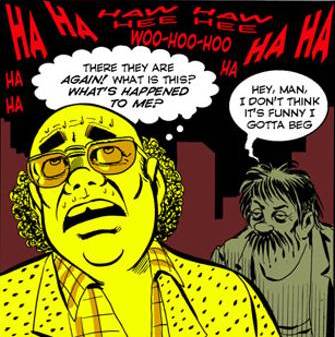 SPURGEON: I noticed that some of your color has the same simplicity of many of those classic horror comics, the old Atlas comics and the like...
SPURGEON: I noticed that some of your color has the same simplicity of many of those classic horror comics, the old Atlas comics and the like...
LASH: I look at that stuff, and it's all good. But my real bible has been those 1970s DC -- I can't call them horror comics --
mystery comics like
Witching Hour and
House of Mystery. I think it was
Tatjana Wood. The coloring of those stories was beautiful, very moody and simple. I draw on that a lot.
SPURGEON: Is there a difference doing color for the screen and doing it for the printed page?
LASH: I haven't done it in print yet! The one story that went from web to print, I changed it to gray tones (
Mavis #5). Which was another job onto itself. I haven't had a chance to bring the color to print yet. I'm working on it. Printing is getting very cheap. You have to find it. I've seen some people at conventions, self-publishers. I'd say, "Boy, you published this yourself?" It's a 32-page color comic. They say, "Yeah, we got printed in Hong Kong." It was like under two grand or something. The coloring was just fine for their purposes.
That's another thing, if I can digress, as to what I'm saying where I think the self-publishing movement -- for lack of a better term -- is going. I've noticed a lot of these younger self-publishers aren't relying on
Diamond. They know they're not going to get anywhere there. They've got a whole grass-roots thing going at conventions. They go city to city. They do just fine in their region, too.
SPURGEON: Do you think that's had an effect on your art and outlook, doing so much hand-selling of your title?
LASH: Yes. And that's a double-edged sword, too. Some of the people I see at the shows I only see once a year. They buy everything that's come out since the last time they saw me. They'll go, "Okay, see you next year, and we'll get whatever you have out." I say, "You gotta support the stores!" [laughs] "The stores drop me when people don't buy the book. Please buy it at the store." And they say, "We'd rather buy it from you."
It's nice to have that connection. I've noticed that people who never bought the book that once they meet me and my effervescent personality [Spurgeon laughs], then they're willing to try
Supernatural Law and purchase a copy. And I have to thank you, Tom, because you say I'm the nicest guy anyone should meet at
Comic-Con. People come to my booth saying, "Tom Spurgeon says you're a nice guy. Show me how nice you are." And I give them a comic.
SPURGEON: Wow. My readers are jerks! [laughter]
LASH: Nah, they are always pleasant.
SPURGEON: That's a relief.
LASH: I wish I could do more shows. It's always nice to meet the readers. It's good to meet other cartoonists, too. When you have that personal contact, you connect. I was kidding when I said "effervescent personality," but when new readers meet me and see how sincere I am, they're willing to give the book a try. And more often than not, they like it!
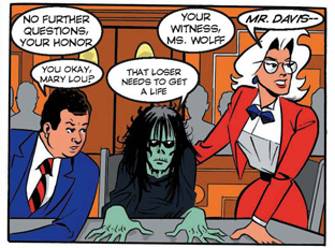 SPURGEON: It's hard to get that first bit of attention from people.
SPURGEON: It's hard to get that first bit of attention from people.
LASH: I know
Supernatural Law isn't to everyone's tastes. However, I think if they tried it, they might be pleasantly surprised.
SPURGEON: Are you worried at all about the economy? Have you done anything to help weather the storm?
LASH: Maybe on a personal, household level. But as far as the comics industry goes? No. Not at all. Comics have always done well in a bad economy. I was at
SPX recently, right around the time everything was hitting the fan. Everyone was concerned the economy was going to hurt the show. The house was packed. Everyone did well. It occurred to me that comics and entertainment in general always does well in bad times. You know how comics fans are. I was like this, too. I can skip
that, but I want
this. I won't have dessert tonight as long as I can get my new copy of
that. We'll get through it. I think people are hungry to get away and escape, to spend a whole day at a convention getting comics. Comics are what the bad times need.
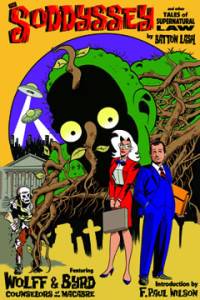 SPURGEON: Is there anything special we should mention, or should people just continue to pay attention to the site and the print releases?
SPURGEON: Is there anything special we should mention, or should people just continue to pay attention to the site and the print releases?
LASH: We have a brand new trade out.
The Soddyssey and other Tales of Supernatural Law. That is the missing volume in our trade paperback series of five books -- volume two:
Wolff & Byrd issues #9-12. Of course I've gone back and drawn many things. [Spurgeon laughs] Talk about being timeless: certain things have been updated.
SPURGEON: You mean there are no more mentions of the Kaiser?
LASH: [laughs] No, things like "I have to find a phone booth" is changed to "I have to use my cell." Libraries have become very important for Exhibit A Press and their target audience is teen readers. I have to make sure everything in the stories happened within the last few years. Not "back in the day"!
SPURGEON: What do you think appeals to the librarians about your work?
LASH: A couple of librarians who don't know each other each told me they thought
Supernatural Law has a good story and a lot to the story that could keep a reader hooked into the series. A lot of things go on. It is not a quick read. They said that people who were checking it out were able to get engrossed in it. They also liked that it was reader friendly: you could get up to speed pretty quick as far as who the characters are and their back story and stuff.
SPURGEON: It's an easy series to pick up on; the concept seems very clear.
LASH: Good art is important, don't get me wrong. Good art and comics go hand in hand. But -- and this may be blasphemous -- it's not as important as a good story. I've noticed that for people in the outside world, people not into comics the way we are, they are pretty indifferent to the art. Their real interest is in a story they can get engrossed in. That's what I would stress. Story over art.
*****
* Lash's long-time leads, I believe taken from a cover
* photo of Lash, such as it is, by Tom Spurgeon
* one of the many monsters around which a serial gets focused
* another one
* cover to the
Mavis series
* cover to
Freshman Year
* I just sort of like this panel
* Li'l Obama
* a limited-color panel
* that line from the client makes me laugh
* the latest trade
* [below] a classic monster
*****
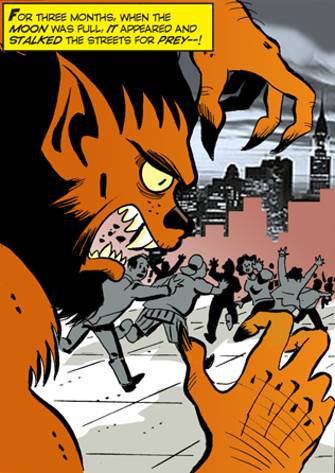
*****
*****
posted 12:00 am PST |
Permalink
Daily Blog Archives
November 2019
October 2019
September 2019
August 2019
July 2019
Full Archives


